初中英语介词用法总结
- 格式:docx
- 大小:46.19 KB
- 文档页数:26
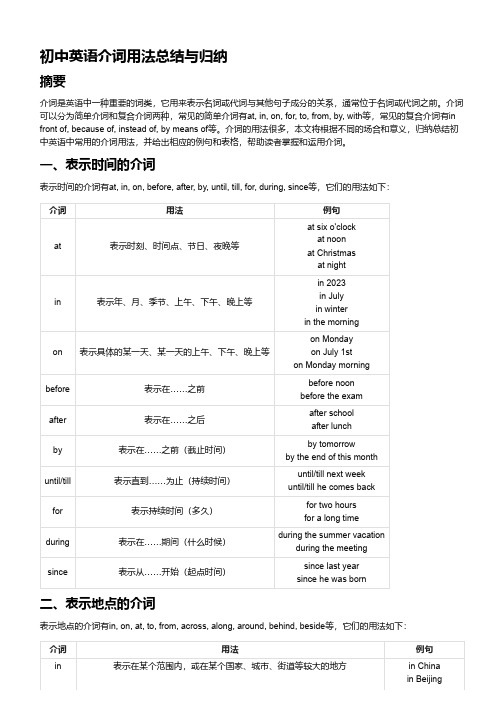
初中英语介词用法总结与归纳摘要介词是英语中一种重要的词类,它用来表示名词或代词与其他句子成分的关系,通常位于名词或代词之前。
介词可以分为简单介词和复合介词两种,常见的简单介词有at, in, on, for, to, from, by, with等,常见的复合介词有in front of, because of, instead of, by means of等。
介词的用法很多,本文将根据不同的场合和意义,归纳总结初中英语中常用的介词用法,并给出相应的例句和表格,帮助读者掌握和运用介词。
一、表示时间的介词表示时间的介词有at, in, on, before, after, by, until, till, for, during, since等,它们的用法如下:介词用法例句at表示时刻、时间点、节日、夜晚等at six o'clock at noonat Christmas at nightin表示年、月、季节、上午、下午、晚上等in 2023in Julyin winterin the morningon表示具体的某一天、某一天的上午、下午、晚上等on Mondayon July 1ston Monday morningbefore表示在……之前before noon before the examafter表示在……之后after school after lunchby表示在……之前(截止时间)by tomorrowby the end of this monthuntil/till表示直到……为止(持续时间)until/till next week until/till he comes backfor表示持续时间(多久)for two hours for a long timeduring表示在……期间(什么时候)during the summer vacation during the meetingsince表示从……开始(起点时间)since last year since he was born二、表示地点的介词表示地点的介词有in, on, at, to, from, across, along, around, behind, beside等,它们的用法如下:介词用法例句in表示在某个范围内,或在某个国家、城市、街道等较大的地方in Chinain Beijing介词用法例句in ZhongshanRoadon表示在某个表面上,或在某个楼层、台阶等较小的地方,或在某个方位上on the wall on the secondflooron the left/rightat 表示在某个具体的位置或地点,或在某个机构、场所等较小的地方,或表示靠近、附近等at the cornerat schoolat the bus stopto表示朝向某个方向或地点,或表示到达某个地点(范围之外)to the east to Japan to schoolfrom表示从某个地点出发或离开(范围之外)from home from Shanghai from Chinaacross表示横穿或穿过(从一边到另一边)across the street across the riveralong表示沿着或顺着(在一边)along the road along the riveraround表示围绕或环绕(在四周)around the lake around the worldbehind表示在……后面behind the door behind himbeside表示在……旁边beside the window beside her三、表示方向的介词表示方向的介词有to, from, into, out of, onto, off, up, down, through等,它们的用法如下:介词用法例句to表示朝向某个方向或地点,或表示目的地He is going to Beijing. She gave the book to me.from表示从某个方向或地点出发或离开,或表示来源He came from the south. This is a gift from my friend.into表示进入某个范围或空间(由外到内)He jumped into the water. She put the flowers into the vase.out of表示离开某个范围或空间(由内到外)He ran out of the room. She took the book out of the bag.onto表示移动到某个表面上(由低到高)He climbed onto the roof. She threw the ball onto the ground.off表示从某个表面上移开(由高到低)He fell off the bike. She took off her hat.up表示向上移动(由低到高)He went up the hill.介词用法例句She climbed up the ladder.down表示向下移动(由高到低)He came down the stairs. She slid down the slide.through表示穿过某个空间或物体(从一端到另一端)He walked through the forest. She looked through the window.四、表示方式、手段、工具的介词表示方式、手段、工具的介词有by, with, in, on等,它们的用法如下:介词用法例句by 表示交通工具、方式、方法等,或表示被动语态的动作执行者,或表示时间的截止点,或表示计量单位等by busby mistakeby himby tomorrowby weightwith 表示使用某种工具、器具、材料等,或表示伴随的人或物,或表示具有某种特征、状态等,或表示原因、理由等with a knifewith hisparentswith long hairwith joyin 表示使用某种语言、文字、颜色等,或表示穿着某种衣服,或表示处于某种状态、情况等,或表示在某种范围内等in Englishin black andwhitein a red dressin a hurryin generalon 表示使用某种电子设备、媒体等,或表示依靠某种力量、条件等,或表示以某种方式等,或表示参与某种活动等on TVon footon fireon dutyon holiday五、表示原因、目的、结果的介词表示原因、目的、结果的介词有for, at, from, of, with, by, because of, owing to, thanks to, out of, through等,它们的用法如下:介词用法例句for 表示原因、理由,常与sorry, famous, punish, praise, thank, blame等连用,也表示目的、意图,常与hope, wish, wait, look, come, go等连用,也可以表示用途、功能等for peacefor helpfor a walkfor funfor cutting paperat表示目的、意图,常与surprised, shocked, amazed, good, bad等连用,也可以表示针对、针对性等at his words at the news at math介词用法例句at solvingproblemsfrom 表示结果、效果,常与different, far, free, safe等连用,也可以表示来源、出发点等from the picturefrom now onfrom dangerfrom birthof 表示原因、理由,常与afraid, proud, sure, tired等连用,也可以表示所属、属性、特征等of the darkof himof the resultof his workwith 表示原因、理由,常与pleased, satisfied, angry, happy等连用,也可以表示伴随、方式、工具等with the answerwith himwith a smilewith a knifeby 表示方式、方法、手段等,也可以表示被动语态的动作执行者,或表示时间的截止点,或表示计量单位等by doing thisby himby tomorrowby weightbecauseof 表示原因、理由,相当于一个从句,后面接名词或代词等because of therainbecause of thatowing to表示原因、理由,相当于一个从句,后面接名词或代词等owing to the trafficjamowing to hisillnessthanks to表示原因、理由,含有感激或讽刺的意味,后面接名词或代词等thanks to yourhelp thanks to his carelessnessout of表示原因、理由,含有出于某种动机或感情的意味,后面接名词或代词等out of curiosity out of pitythrough表示原因、理由,含有经过某种过程或方式的意味,后面接名词或代词等through hard work through a window六、表示对象、范围的介词表示对象、范围的介词有of, for, about, with, to, from, among, between等,它们的用法如下:介词用法例句of表示所属、属性、特征等,也可以表示分离、脱离等the color of the skya cup of teaa friend of mineget rid of itfor表示目标、对象、受益者等,也可以表示目的、原因等 a gift for youa seat for twoa doctor for the poora room for rentabout表示主题、内容、话题等,也可以表示大约、左右等a book about history tell me about yourself about ten minuteswith表示伴随、陪同等,也可以表示方式、工具等stay with mea man with glasses speak with a loud voice cut it with a knifeto表示方向、目的地等,也可以表示对象、接受者等go to school fly to London say hello to him give it to herfrom表示来源、出发点等,也可以表示对象、对比者等come from Chinaa letter from my father different from youlearn from himamong表示在三个或三个以上的人或物之间(内部)share it among yourselves a flower among the grassbetween表示在两个人或物之间(内部或外部)sit between thema river between two mountains七、其他常用的介词除了上述介词外,还有一些其他常用的介词,如as, like, except, without, beyond, above, below, over, under等,它们的用法如下:介词用法例句as表示身份、职业、角色等,也可以表示方式、方法、程度等as a teacher as usual as you know as well aslike表示相似、类似等,也可以表示喜欢、喜爱等like a birdlike father, like sonI like music.except表示除……之外(不包括)everyone except me every day except Sundaywithout表示没有、缺少等without money without water without a wordbeyond表示超出、超过等beyond the wall beyond my expectation beyond controlabove表示在……之上(不接触)above the ground above sea levelabove allbelow表示在……之下(不接触)below the surface below zero below averageover表示在……之上(覆盖或接触)over the bridge over his head over the phoneunder表示在……之下(覆盖或接触)under the tree under his arm under the weather。

初中英语介词的用法一、介词按其构成可分为:1. 简单介词 at, in, on, to, since, until 等。
如:He's worked there since 1998.2. 复合介词 into, onto, out of 等。
如:She is out of school. 她毕业了。
3. 二重介词 from under, from behind, from out of, until after, except in 等。
如:I'm from out of town. 我是从城外来的。
4. 短语介词 because of, instead of, in spite of 等。
如:I went back not because of the rain, but because I was tired.我回去不是因为下雨,而是因为我累了。
二、介词的作用:1. 表示地点:after, along, at, below, by, of, near, over, through, under 等。
如:Near the village the boys are skating on the ice. 男孩子们正在村子附近的冰上滑冰。
They lay down under the shade of a tree. 他们躺在一棵树的树阴下。
2. 表示时间:about, after, across, at, during, for, in, of, till, until 等。
如:After class he will tell us about the accident. 课后他将告诉我们有关事故的情况。
A heavy rain has been falling across three days. 一场大雨下了整整三天。
The accident happened during the night. 事故发生在夜间。
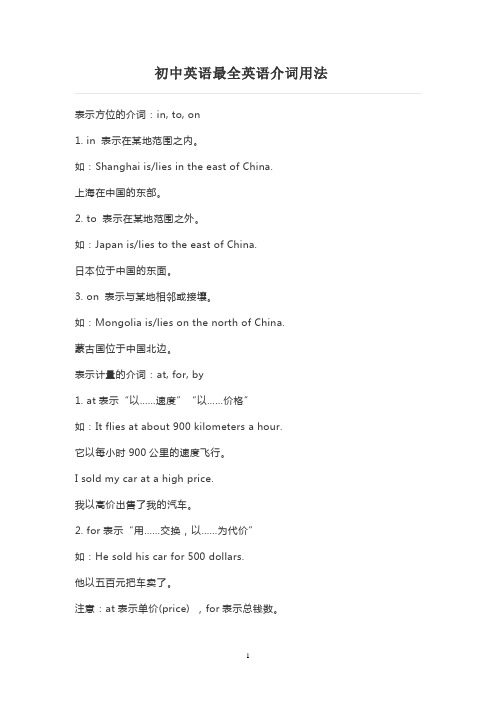
表示方位的介词:in, to, on1. in 表示在某地范围之内。
如:Shanghai is/lies in the east of China.上海在中国的东部。
2. to 表示在某地范围之外。
如:Japan is/lies to the east of China.日本位于中国的东面。
3. on 表示与某地相邻或接壤。
如:Mongolia is/lies on the north of China.蒙古国位于中国北边。
表示计量的介词:at, for, by1. at表示“以……速度”“以……价格”如:It flies at about 900 kilometers a hour.它以每小时900公里的速度飞行。
I sold my car at a high price.我以高价出售了我的汽车。
2. for表示“用……交换,以……为代价”如:He sold his car for 500 dollars.他以五百元把车卖了。
注意:at表示单价(price) ,for表示总钱数。
3. by表示“以……计”,后跟度量单位如:They paid him by the month.他们按月给他计酬。
Here eggs are sold by weight.在这里鸡蛋是按重量卖的。
表示材料的介词:of, from, in1. of成品仍可看出原料如:This box is made of paper.这个盒子是纸做的。
2. from成品已看不出原料如:Wine is made from grapes.葡萄酒是葡萄酿成的。
3. in 表示用某种材料或语言如:Please fill in the form in pencil first.请先用铅笔填写这个表格。
They talk in English.他们用英语交谈。
注意:in指用材料,不用冠词;而with指用工具,要用冠词。
如:draw in pencil/draw with a pencil表示工具或手段的介词:by, with, on1、by用某种方式,多用于交通如by bus乘公共汽车,by e-mail. 通过电子邮件。
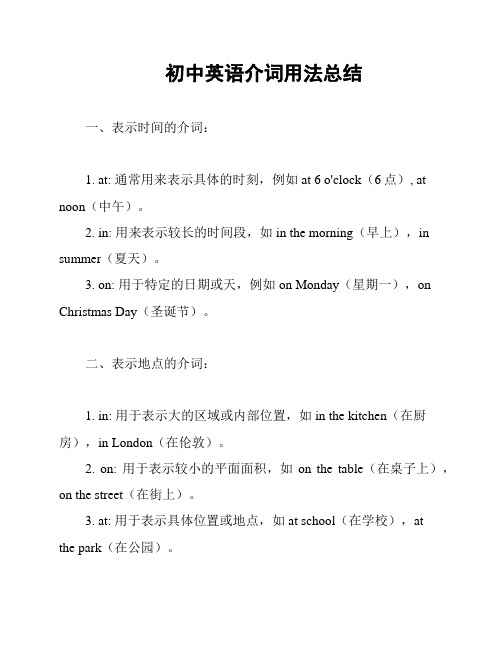
初中英语介词用法总结一、表示时间的介词:1. at: 通常用来表示具体的时刻,例如 at 6 o'clock(6点), at noon(中午)。
2. in: 用来表示较长的时间段,如 in the morning(早上),in summer(夏天)。
3. on: 用于特定的日期或天,例如 on Monday(星期一),on Christmas Day(圣诞节)。
二、表示地点的介词:1. in: 用于表示大的区域或内部位置,如 in the kitchen(在厨房),in London(在伦敦)。
2. on: 用于表示较小的平面面积,如on the table(在桌子上),on the street(在街上)。
3. at: 用于表示具体位置或地点,如 at school(在学校),atthe park(在公园)。
三、表示方式、方式、原因的介词:1. by: 表示通过某种方式或手段,如 by bus(乘公交车),by email(通过电子邮件)。
2. with: 表示伴随或使用某物,如with friends(和朋友一起),with a pen(用一支笔)。
3. for: 表示目的或原因,如 for fun(为了好玩),for the reason (因为...)。
四、表示动作方向的介词:1. to: 表示运动或行动的方向,如 go to school(去学校),send a letter to(寄一封信给)。
2. into: 表示进入某个内部空间,如 jump into the pool(跳进游泳池)。
五、表示关系和连接的介词:1. of: 表示所有关系,如 a photo of my family(我家的照片)。
2. with: 表示随同或具有某种关系,如 a girl with long hair(一位长发的女孩)。
3. to: 表示某种连接或关联,如 the key to the door(开门的钥匙)。

初中英语介词的知识点总结介词是一种用来表示词词, 词与句之间的关系的词。
在句中不能单独作句字成分。
介词后面一般有名词代词或相当于名词的其他词类,短语或从句作它的宾语。
以下是为大家整理的初中英语介词的知识点总结,欢迎大家阅读与借鉴!一、表示时间的介词时间介词有in , on,at,after,since,during,by,before,after,until等,前三个介词用法有个口诀:at午夜、点与分,上午、下午、晚用in。
年、月、年月、季节、周,之前加上介词in。
将来时态多久后,这些情形亦用in。
日子、日期、年月日,星期之前要用on。
其余几组常见的时间介词辨析如下辨析如下:1、时间介词in与after 的用法辨析介词in + 一段时间用于一般将来时。
如:We’ll go to school in two weeks.介词after + 一段时间用于一般过去时。
如:My mother came home after half an hour.介词after + 时间点常用于一般将来时。
如:We’ll go out fora walk after supper.2、时间介词for与since的用法辨析介词for 表示一段时间如:I have been living here for 10years.介词since 表示从过去某一时间以来如:I have been living here since 2000.3、时间介词before与by的用法辨析介词before表示“在…之前”如:He won’t come back before five .介词by表示“到…时为止,不迟于…”如:The work must be finished by Friday.4、时间介词during与for的用法辨析当所指的时间起止分明时用介词during如:He swims every day during the summer.如果一段时间不明确则用介词for如:I haven’t seen her for years.5、时间介词till与until用法的异同till和until用在肯定句中,均可表示“直到…为止”,如:I will wait till(until)seven o'clock.till和until用在否定句中,均可表示“在…以前”或“直到…才”。

介词一、意思是“用”的几个词介词有三个:in,with, by,在句首或句末作状语。
1。
in+language (English, Chinese,French, Japanese等),What's this in English?In English,it's an orange。
2. with +具体的工具(pen,pencil, knife 等),单数名词前要加冠词。
I want to write with a pencil,and I don’t like write with a pen。
Chinese people eat food with chopsticks,but western people like to eat food with knives and forks。
3。
by + 抽象的工具(e—mail, force,phone 等)表方式或手段,名词前不用冠词;by+ 动名词或动名词短语(通过,靠,以);by+交通工具(car, bus, bike)Send this letter by e-mail。
She lives by selling fruit。
My mother makes living by teaching.动词有一个:use;use sth to do sthChinese people use chopsticks to eat food。
We use a knife to cut.二、in的用法1.in+月份、年份;on+日子/星期/某个不确定的具体日子in March,in 2014,in march 2014on April 1, on Monday,on a rainy day此外:in the morning/ afternoon/ evening/ night; in spring/ summer/ autumn/ winterat noon/ night/ midnightat 8 o’clock2。
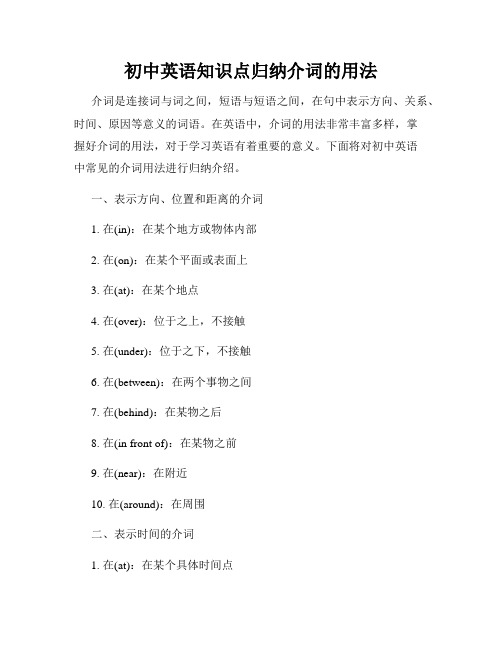
初中英语知识点归纳介词的用法介词是连接词与词之间,短语与短语之间,在句中表示方向、关系、时间、原因等意义的词语。
在英语中,介词的用法非常丰富多样,掌握好介词的用法,对于学习英语有着重要的意义。
下面将对初中英语中常见的介词用法进行归纳介绍。
一、表示方向、位置和距离的介词1. 在(in):在某个地方或物体内部2. 在(on):在某个平面或表面上3. 在(at):在某个地点4. 在(over):位于之上,不接触5. 在(under):位于之下,不接触6. 在(between):在两个事物之间7. 在(behind):在某物之后8. 在(in front of):在某物之前9. 在(near):在附近10. 在(around):在周围二、表示时间的介词1. 在(at):在某个具体时间点2. 在(in):在某个时间段3. 在(on):在某个具体日期三、表示原因的介词1. 因为(of):表示原因、缘故2. 由于(because of):表示原因、由于四、表示目的、用途和方式的介词1. 为了(in order to):表示目的2. 以便(in order that):表示目的3. 用(with):表示使用的手段或工具4. 通过(by):表示方式、方法5. 以(for):表示目的五、表示比较的介词1. 比较起见(than):表示比较的对象2. 和(with):与某人或某物在一起六、其它常见的介词1. 关于(about):表示涉及某一话题2. 靠(by):表示接近某人或某物3. 经过(through):表示通过某地或某事4. 编写(at):表示在某地工作或活动5. 因(as):表示角色、身份6. 例如(for example):表示举例7. 包括(including):表示包含某物以上是初中英语中常见的介词用法的归纳总结。
熟练掌握这些介词的用法,对于构建正确的句子和语法结构非常重要。
希望能对你的学习有所帮助。
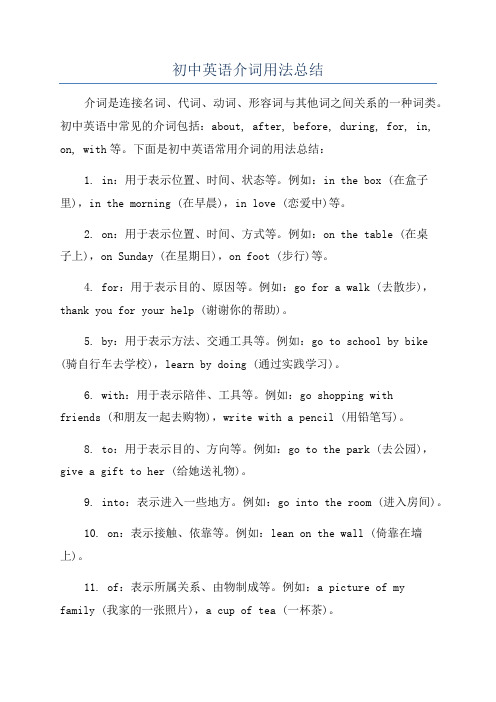
初中英语介词用法总结介词是连接名词、代词、动词、形容词与其他词之间关系的一种词类。
初中英语中常见的介词包括:about, after, before, during, for, in, on, with等。
下面是初中英语常用介词的用法总结:1. in:用于表示位置、时间、状态等。
例如:in the box (在盒子里),in the morning (在早晨),in love (恋爱中)等。
2. on:用于表示位置、时间、方式等。
例如:on the table (在桌子上),on Sunday (在星期日),on foot (步行)等。
4. for:用于表示目的、原因等。
例如:go for a walk (去散步),thank you for your help (谢谢你的帮助)。
5. by:用于表示方法、交通工具等。
例如:go to school by bike (骑自行车去学校),learn by doing (通过实践学习)。
6. with:用于表示陪伴、工具等。
例如:go shopping withfriends (和朋友一起去购物),write with a pencil (用铅笔写)。
8. to:用于表示目的、方向等。
例如:go to the park (去公园),give a gift to her (给她送礼物)。
9. into:表示进入一些地方。
例如:go into the room (进入房间)。
10. on:表示接触、依靠等。
例如:lean on the wall (倚靠在墙上)。
11. of:表示所属关系、由物制成等。
例如:a picture of myfamily (我家的一张照片),a cup of tea (一杯茶)。
12. with:表示伴随、具有。
例如:a girl with long hair (一个长发的女孩),a book with pictures (一本有图片的书)。

介词XDF Duno1、时间介词:①at表示时间,通常指钟点、夜里、中午、拂晓等词组中,同时在某些节假日也常用at。
例如:②on特指具体到某一天或某一天的早中晚。
例如:③in可用来表示世纪、年、月、季节,在上午、下午、晚上等。
例如:④during强调时间延续性,表“在......期间”。
例如:During my stay in Jinan, I got married with my girlfriend.(在我居住在济南的期间,我跟我女友结婚了)⑤from表示时间,意为“从......”;也可以与to搭配为from…to…表示“从......到......”例如:He was in Beijing University from 1979 to 1983.(他从1979年到1983 年在北京大学)⑥after/ in 皆可表示:在……之后区别为:in +时间段:与将来时连用after +时间段:与过去时连用after +时间点:可与将来时连用2、方位介词①in 表“在……里面”,表在范围之内。
in the classroom 在教室里②on 表“在……上面,指表面接触”on the table 在桌子上③at 表在某处(强调一个小地方)at the door 在门口④under 表示在…下面under the desk 在桌子下⑤between 表示在两者之间。
between…and…,表示在...和...之间。
(比如你我之间,between you and me)among 表示在三者或三者以上的事物之间。
(比如我在学生们之间,I am among my students)⑦through & over & across 穿过through 从内部穿过(例如穿过教室),over 多指在上面越过(比如越过山),在垂直上方across指表面穿过(例如过马路)2、方式介词①with “用”表示使用工具:with my phone表示使用某种器官:see with our eyes(用我们眼睛看)②in “用”表示使用某种语言:in English 用英语表示使用声音:in a high voice 使用高声表示穿某种颜色衣服:in white 穿白颜色的衣服③by表示乘坐交通工具后面直接加交通工具即可by bus乘公交。
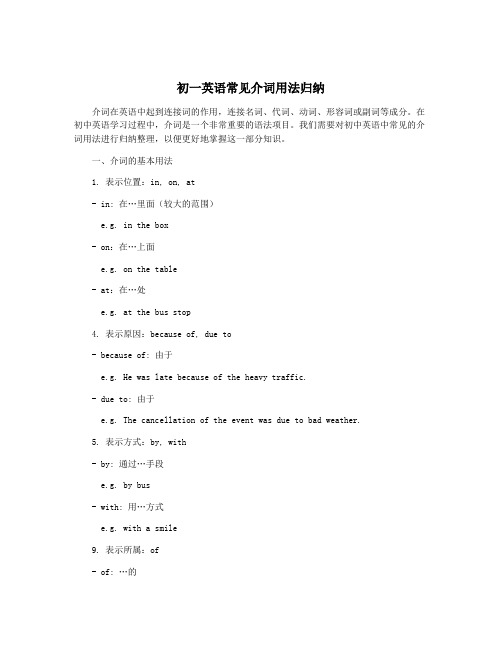
初一英语常见介词用法归纳介词在英语中起到连接词的作用,连接名词、代词、动词、形容词或副词等成分。
在初中英语学习过程中,介词是一个非常重要的语法项目。
我们需要对初中英语中常见的介词用法进行归纳整理,以便更好地掌握这一部分知识。
一、介词的基本用法1. 表示位置:in, on, at- in: 在…里面(较大的范围)e.g. in the box- on:在…上面e.g. on the table- at:在…处e.g. at the bus stop4. 表示原因:because of, due to- because of: 由于e.g. He was late because of the heavy traffic.- due to: 由于e.g. The cancellation of the event was due to bad weather.5. 表示方式:by, with- by: 通过…手段e.g. by bus- with: 用…方式e.g. with a smile9. 表示所属:of- of: …的e.g. the hat of the boy2. look forward to: 期待e.g. I am looking forward to the summer vacation.5. be interested in: 对…感兴趣e.g. Amy is interested in learning Chinese.三、常见介词错误用法及纠正1. 错误用法:depend of正确用法:depend one.g. We depend on each other.通过以上的介词错误用法及纠正,我们可以更清晰地了解该如何正确使用这些介词。
四、综合练习通过上述的综合练习,可以帮助大家更好地掌握介词用法。

介词考点1、表示时间的介词表示时间的介词有at, in, after, until, before, during.1.at多用于表示具体的钟点时刻前,如:at seven, at a quarter to one; 也用于固定搭配中,如:at noon,at night。
2.in 表示一段时间,用于年、月、世纪、四季或泛指的一天的上午、下午、晚上等。
如:in thetwenty-five century 在21世纪,in autumn 在秋天,in the morning 在早上;还可用于表示“从现在起,多长时间以后或多久之后”3.on 主要用在星期几,具体某一天或某一天的早、中、晚或节日前。
如:on Mid-autumn day 在中秋节on June 1st在6月1日4.since,from和for(1) since指从某时一直延续至今,后接时间点,只要用完成时。
如:He has lived here since 1993. 从1993年开始他一直住这里。
(2)from说明开始的时间,谓语可用过去、现在、将来的某种失态。
如:From now on, I will learn English in the morning. 从今以后,我将在早晨学英语。
(3)for指动作延续贯穿整个过程,后接时间段,主句用完成时。
如:I have studied English for six years. 我已经学英语六年了。
5. (1)after表示以过去为起点的某一段时间之后,用于过去时。
如:They finished the work after two years. 我们两年后完成了这项工作。
(2)after 与时间点连用表示将来某个时间之后,如:I’ll ring you up after two o’clock. 我会在两点后打电话给你。
6. “by + 时间点”表示“到……以前为止”,如果by 后跟一个过去的时间点应用过去完成时。

初中英语知识点归纳介词短语的常见搭配与用法初中英语知识点归纳:介词短语的常见搭配与用法介词短语在英语中是非常常见且重要的语法结构之一。
掌握了介词短语的常见搭配与用法,对于学习和运用英语语言来说至关重要。
本文将归纳介绍初中英语中常见的介词短语搭配及其用法。
一、关于地点的介词短语1. in front of - 在...前面例句:The school is located in front of the park.2. at the top/bottom of - 在...的顶部/底部例句:The book you are looking for is at the top of the shelf.3. on the left/right - 在...的左边/右边例句:She lives in the house on the left.4. next to - 紧挨着,旁边例句:There is a café next to the library.5. in the middle of - 在...的中间例句:The monument stands in the middle of the park.二、关于时间的介词短语1. at (a specific time) - 在(特定时间)例句:I will meet you at 3 o'clock.2. in (a month/year/season) - 在(某个月份/年份/季节)例句:My birthday is in December.3. on (a specific day/date) - 在(特定日子/日期)例句:We usually have a family gathering on Christmas Day.4. during (a period of time) - 在(某段时间)例句:I traveled to Europe during the summer vacation.5. from...to - 从...到...例句:The museum is open from 9 a.m. to 5 p.m.三、关于方式的介词短语1. by car/bus/bike - 通过汽车/公交车/自行车例句:I usually go to work by bike.2. on foot - 步行例句:He goes to school on foot every day.3. with the help of - 在...的帮助下例句:He completed the project with the help of his teammates.4. in a hurry - 匆忙地例句:I left the house in a hurry and forgot to bring my phone.5. by myself/ourselves - 自己例句:I finished the homework by myself.四、关于目的的介词短语1. for (a purpose) - 为了(某个目的)例句:She is studying hard for the exam.2. to (a place) - 去(某个地方)例句:I am going to the supermarket to buy some groceries.3. in order to - 为了例句:He saved money in order to buy a new car.4. with the aim of - 以...为目标例句:They started the project with the aim of promoting environmental awareness.五、关于原因的介词短语1. because of - 因为例句:The match was canceled because of the heavy rain.2. due to - 因为例句:The flight was delayed due to bad weather conditions. 3. as a result of - 由于例句:As a result of his hard work, he obtained excellent results.4. thanks to - 多亏了例句:Thanks to your help, I finished the task on time.六、关于状态的介词短语1. in good/bad condition - 状况良好/不好例句:The car is in good condition after the repair.2. with the help of - 在...的帮助下例句:He fixed the broken computer with the help of his friend.3. under pressure - 在压力下例句:She always performs well under pressure.4. by accident - 偶然地例句:I found this book by accident while cleaning the attic.七、关于数量的介词短语1. a couple of - 两个,几个例句:I bought a couple of books from the bookstore.2. a few - 几个,少量例句:I have a few friends who live in this city.3. a lot of - 许多例句:There are a lot of people in the park today.4. plenty of - 充足的例句:There is plenty of food at the party, so don't worry.以上是初中英语中常见的介词短语搭配及其用法的归纳。

介词总结归纳初中介词是英语语法中的一个重要部分,用来表示名词、代词与其他词之间的关系。
在初中阶段,学生需要掌握并正确运用各种介词。
下面将对初中阶段常见的介词进行总结归纳。
一、表示位置或方向的介词:1. in:在某个范围、地点或建筑物内。
例:I am studying in the classroom.2. on:在某个平面或物体的表面。
例:The book is on the table.3. at:在某个特定的地点或事件上。
例:He is waiting at the bus stop.4. under:在某物的下面。
例:The cat is under the table.5. above:在某物的上面。
例:The bird is flying above the tree.6. behind:在某物的后面。
例:The car is parked behind the house.7. in front of:在某物的前面。
例:The children are playing in front of the school. 8. between:在两个物体或位置之间。
例:The river flows between the two mountains.9. among:在三个或三个以上的物体或位置之间。
例:He found his friends among the crowd.二、表示时间的介词:1. at:在特定的时间点。
例:The movie starts at 7 o'clock.2. on:在某一天、日期或节日。
例:We have a holiday on Sunday.3. in:在某个时间段或季节。
例:She was born in October.4. during:在某个时间段内。
例:I read a book during the summer vacation.5. for:表示持续时间。
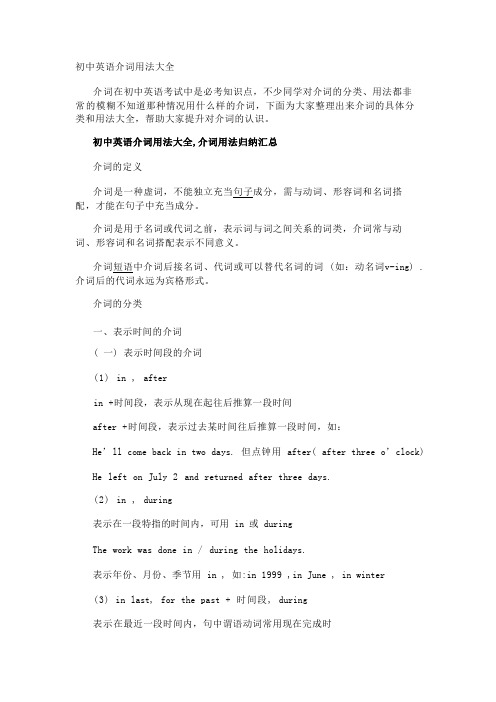
初中英语介词用法大全介词在初中英语考试中是必考知识点,不少同学对介词的分类、用法都非常的模糊不知道那种情况用什么样的介词,下面为大家整理出来介词的具体分类和用法大全,帮助大家提升对介词的认识。
介词的定义介词是一种虚词,不能独立充当句子成分,需与动词、形容词和名词搭配,才能在句子中充当成分。
介词是用于名词或代词之前,表示词与词之间关系的词类,介词常与动词、形容词和名词搭配表示不同意义。
介词短语中介词后接名词、代词或可以替代名词的词 (如:动名词v-ing) . 介词后的代词永远为宾格形式。
介词的分类一、表示时间的介词( 一) 表示时间段的介词(1) in , afterin +时间段,表示从现在起往后推算一段时间after +时间段,表示过去某时间往后推算一段时间,如:He’ll come back in two days. 但点钟用 after( after three o’clock) He left on July 2 and returned after three days.(2) in , during表示在一段特指的时间内,可用 in 或 duringThe work was done in / during the holidays.表示年份、月份、季节用 in , 如:in 1999 ,in June , in winter(3) in last, for the past + 时间段, during表示在最近一段时间内,句中谓语动词常用现在完成时I have been in Shanghai in the last few years.(4) for 表示延续一段时间。
I’ll study in the U.S for two yearsI’ve waited for Bingo for half an hour.(二) 表示某一时间的介词(1) at, onat 表示某一时刻,on 表示某一天或日期, 如:at 7:14, on Saturday morning on the night of May2一天内各段时间表达, 选用正确的介词,请比较:in the morningon a winter / snow / cold / morningat nighton the night of March 7thin the eveningon Friday evening(2)before, bybefore 表示某一时间之前,而 by 表示到某一时间止,句中谓语动词多用完成时态。

初中阶段介词用法汇编※一、表示时间的介词:1、at、on、in“at时间点,有on必有天,in指月季年,也和色相连”就是说,有具体的时间点的时候用at,具体那一天用on,说到月份,季节,年份,就用in ;而且说谁穿了什么颜色的衣服的时候,也是用in XX(color)】at用于某一具体时刻或重大节日之前①在五点钟______②在中午________③在夜晚________④在圣诞节________⑤在午夜_________【答案】①at five o’clock ②at noon ③at night ④at Christmas ⑤at midnight(2)on用在具体某一天或某天的上午、下午、晚上之前①在国庆节_________②在周二晚上_________③在星期天_________【答案】①on National Day ②on Tuesday evening ③on Sunday(3)in用在周、日、季节或泛指的上午、下午、晚上前①在一周内_________②在五月_________③在夏季_________④在2009年_________⑤在下午_________ 【答案】①in a week ②in may ③in summer ④in 2009 ⑤in the afternoon归纳总结在初中阶段常见的固定短语in English用英语 in a minute一会儿、立刻 in a short while一会儿、不久in a hurry匆匆忙忙 in danger在危险中 in full全部地、详细地in a word一句话 in all总共 in every case不管怎样in the end最后 in spite of尽管 in person亲自in fact事实上 in good health身体健康的 in front of在……前面in some ways在某些方面 in common共同的 in public当众☆考题再现:---Who was the first man with A(h1n1) flu in mainland China know for sure?---________May 11,2009.A InB OnC ForD Since【答案】B 【解析】在具体的某一天用on2、before、afterbefore表示“在某时刻或某件事之前”,after用在时刻或某件事之后。

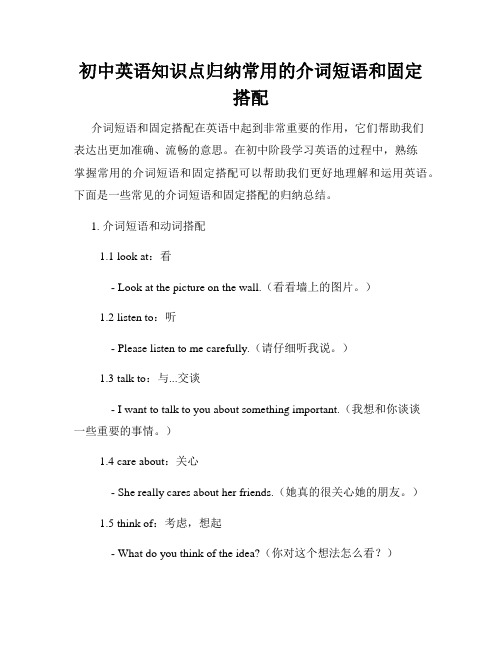
初中英语知识点归纳常用的介词短语和固定搭配介词短语和固定搭配在英语中起到非常重要的作用,它们帮助我们表达出更加准确、流畅的意思。
在初中阶段学习英语的过程中,熟练掌握常用的介词短语和固定搭配可以帮助我们更好地理解和运用英语。
下面是一些常见的介词短语和固定搭配的归纳总结。
1. 介词短语和动词搭配1.1 look at:看- Look at the picture on the wall.(看看墙上的图片。
)1.2 listen to:听- Please listen to me carefully.(请仔细听我说。
)1.3 talk to:与...交谈- I want to talk to you about something important.(我想和你谈谈一些重要的事情。
)1.4 care about:关心- She really cares about her friends.(她真的很关心她的朋友。
)1.5 think of:考虑,想起- What do you think of the idea?(你对这个想法怎么看?)1.6 believe in:相信- I believe in you.(我相信你。
)1.7 rely on:依赖- He can rely on his parents for support.(他可以依赖他的父母得到支持。
)1.8 take care of:照顾- Can you take care of my dog while I'm away?(我离开时你能照顾我的狗吗?)2. 介词短语和名词搭配2.1 in front of:在...前面- There is a park in front of my house.(我家前面有一个公园。
)2.2 on top of:在...顶部- The cat is on top of the table.(猫在桌子上方。
初中英语介词用法总结介词是一种虚词,不能独立充当句子成分,需与动词、形容词和名词搭配,才能在句子中充当成分。
介词是用于名词或代词之前,表示词与词之间关系的词类,介词常与动词、形容词和名词搭配表示不同意义。
介词短语中介词后接名词、代词或可以替代名词的词(如:动名词v-ing).介词后的代词永远为宾格形式。
介词的种类:1)简单介词:about。
across。
after。
against。
among。
around。
at。
before。
behind。
below。
beside。
but。
by。
down。
during。
for。
from。
in。
of。
on。
over。
near。
round。
since。
to。
under。
up。
with等等。
2)分解介词:inside。
into。
outside。
throughout。
upon。
without。
within3)短语介词:according to。
along with。
apart from。
because of。
in front of。
in spite of。
insteadof。
owing to。
up to。
with reguard to4)分词介词:considering。
reguarding。
including。
concerning介词短语:构成介词+名词We go to school from Monday to Saturday.介词+代词Could you look for it instead of me?介词+动名词XXX.介词+毗连代/副词I was thinking of how we could get there. 介词+不定式/从句XXX it.介词的用法:1、介词to的常见用法1.动词+toa)动词+ toadjust to适应。
attend to处理;照管。
agree to赞同。
amount to加起来达…。
XXX属于。
drink to为…干杯。
get to抵达。
XXX发生在某人身上。
hold to紧握。
lead to通向。
XXX听。
occur to想起。
object to否决。
point to指向。
XXX回答。
refer to参考;指的是…;涉及。
reply to回答。
XXX负责。
stick to坚持。
turn to求助。
write to给某人写信。
b)动词(+sth.)+to+sb.XXX告诉某人。
XXX向某人描述。
XXX向某人申明。
XXX对某人表达,XXX说起。
XXX向某人颔首。
report to敷陈。
say to奉告。
XXX对某人大叫。
XXX对某人提发起,XXX与某人扳谈。
XXX跟某人言语。
XXX和某人低声私语。
c)动词+XXX.add to增长。
compare to比作。
carry to运送至。
XXX努力于,XXX介绍给。
inviteto约请加入。
join to毗连到。
leave to委托给,ce to降落至。
XXX判处。
take to带到。
2.be +描述词/过去分词+ tobe XXX觉察;晓得。
XXX留意;留神。
be awake to知晓。
be blind to缺乏眼光。
be close to紧挨着。
be common to对某人来讲很通俗。
be XXX违反;反对。
be XXX致力。
be deaf to不乐意听。
be equal to有…的气力。
XXX露出;蒙受。
be fair to对…公正。
be XXX对某人来讲熟。
be XXX对某人心存感激。
be good to对…有好处。
be XXX对…紧张。
XXX友爱对待。
be known to周知于。
be married to嫁给。
XXX转移到。
be near to靠近。
be XXX对…有必要。
XXX在劈面。
XXX反对。
be XXX合某人之意。
XXX专属。
XXX礼貌待人。
be rude to粗暴对待。
be relative to与…有关。
be strange to不惯。
be similar to类似。
be suitable to适合。
be true to忠实。
be XXX感激。
be XXX对…有用。
be used to惯。
3.to+名词构成的词组XXX在某种水平上。
to date到目前为止,to one’s feet跳起来,to one’s mind照…看来。
to one’s surprise使…受惊,to one’staste吻合胃口。
to oneself单独享用。
to order定做,XXX彻彻底底地。
to the point中肯地二、at的常见用法at构成的词组比较多,要细心区分。
1.动词+ atarrive at抵达,XXX访问某地。
XXX(it)就地捉住。
come at 进犯。
fire at向…开战。
XXX瞟一眼。
XXX怒目而视。
XXX at忧伤,XXX 敲,XXX at嘲笑。
look at看一眼。
pull at拉扯。
rejoice at对…高兴,XXX向某人微笑。
XXX…射击。
XXX怒目而视,XXX 刺向。
XXX撕。
XXX颤抖,XXX吃惊,XXX工作。
2.be +形容词/过去分词+ atXXX恼怒于。
XXX对…保持警觉,XXX对…吃惊。
be bad at不擅长。
be XXX对某事很灵巧,XXX高兴,be disgusted at 厌恶。
XXX对…失望,be good at擅长。
be impatient at对…不够耐心。
be mad at狂热于,XXX对…感到高兴。
be present at出席。
be satisfied at满意,be surprised at吃惊。
XXX对…非常3.at+名词构成的词组XXX在一定间隔,at a loss不知所措,at a time一次,at all一点也不,at any cost不吝一切价格,at XXX最好也只是,at first起初,at hand手头,at heart在内内心,at home在家;无拘束,at last末了,at least最少,at most最多,at once立时,XXX目前。
三、介词on的常见用法on的用法比较重要,本文介绍它的一些常见用法:1.动词+ona)动词+ on要当真辨别下面一些词组act on对…有作用。
bring on促使;招致。
call on拜访某人,count on依赖。
carry on履行,dependon取决。
feed on以…为生,figure on预想;揣度。
go on连续,have on穿着。
insist on坚持,keep on连续。
lean on依赖。
live on以…为生。
pull on疾速穿上,put on穿上。
switch on接通(电源)。
taketo喜爱;养成;苟且学会,turn on接通(电源)。
work on操纵。
wait on伺候。
b)动词+sb.(sth.)+ on +sb.(sth.)base on以…为基础。
congratulate on恭贺。
fix on固定。
have mercy on怜悯,have pity on怜惜。
keep watch on监视。
XXX把时间、精力花在某方面。
2.be+描述词+on的词组be dependent on依赖。
be hard on对某人苛刻,XXX…印象深刻。
XXX渴望。
XXX…严格。
3.on+名词构成的词组on board乘(车,飞机),on call听候召唤。
on duty值班。
on earth到底。
on fire着火。
on foot步行,on guard在岗,on hire雇用,on holiday度假四、介词in的常见用法1.动词+ina)动词+ inXXX信任。
break in碎成,bring in引起;产生;带来。
call in下令收回。
fill in填充,getin收获。
hand in上缴。
involve in涉及。
XXX在于。
result in导致。
share in共享,succeed in成功。
b)动词+sb./time/money+ inXXX帮助某人做某事。
spare time/money in匀出时间或钱做某事,XXX in花时间或钱做某事,XXX浪费时间或钱做某事。
2.be +描述词+ inXXX活跃于,XXX专心致志,XXX忙碌,XXX出生于,XXX 牵涉,XXX穿着,bedisappointedin对…失望,XXX勤于,XXX…有经验。
be XXX任职于,XXX忙碌。
XXX某方面的专家。
XXX 在…优秀,be interested in对…有兴趣。
be lacking in缺乏。
be rich in富有,beslow in迟缓。
be successful in在某方面成功。
be skilled in精于,be strict in严于。
be weak in弱于。
3.in +名词in advance提前,in all总共,XXX总而言之,in bed卧床,XXX亲自,in brief简明扼要,in case万一。
in charge主管,in danger有危险。
in debt负债。
in despair失望,in force大量地;有效,in full全部地。
in flower开花,in general一般说来,in itself本身。
in love恋爱。
inorder井然有序。
in person亲自,in public公开地。
in progress有进展。
in practice从实践上看。
inrags穿着破衣,in research探索。
in return作为报答,in ruins一片废墟,in short总之,XXX从理论上看。
in trouble有麻烦。
in tears眼泪汪汪,in time及时。
in turn按顺序。
XXX白白地,XXX看得见。
五、介词from的常见用法from的用法可不克不及小瞧,你纷歧定晓得下面这些词组意义。
1.动词+froma)动词+ fromcomefrom来自,datefrom追溯,departfrom违背,diefrom死于,escapefrom逃出,fallfrom自…跌落。
XXX垂挂。
hear from 收到来信,learn from向某人进修。
return from自某地返回,rise from自…冒出。
result from原因于。
suffer from忍耐。
b)动词+ sth./sb。
+from + sth./ sb。
/a placeborrow from向…借。
choose from选自。
excuse from免除。
keep from阻止做,prevent from不准做。
protect from不受…之害。
receive from收到,remove from移动;除去。
save from保全;拯救。